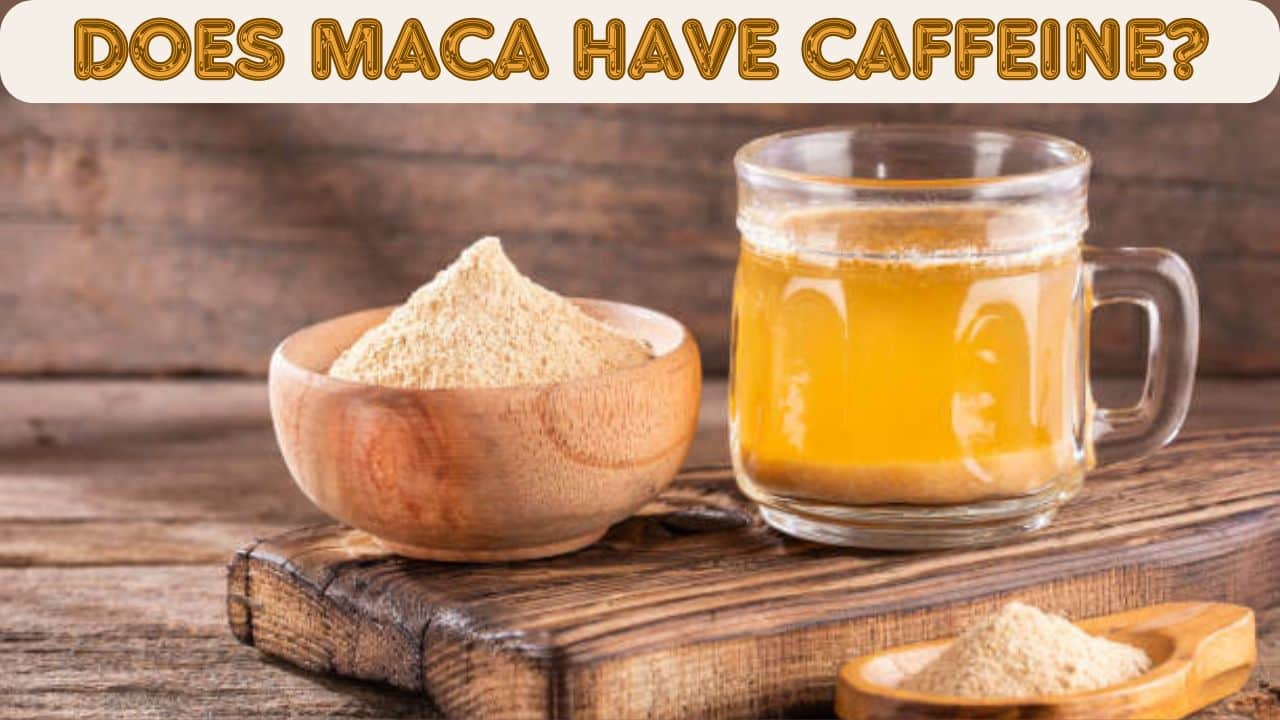Written By: Sherry Harris
Maca, a root vegetable native to the Andes Mountains, has gained popularity in the health and wellness community for its numerous benefits. But a common question arises: Does maca have caffeine? With energy-boosting properties often attributed to maca, it’s easy to see why some might assume it contains caffeine.
This article dives deep into the science behind maca, examining its composition, benefits, and whether or not it includes caffeine. We’ll also compare it with other energy-boosting substances, ensuring you have all the facts to make informed decisions about incorporating maca into your diet.
Table of Contents
What is Maca?
Maca, scientifically known as Lepidium meyenii, is a cruciferous vegetable that grows high in the Peruvian Andes. Traditionally, it has been cultivated for over 2,000 years and was used by ancient civilizations for its medicinal properties and as a food source. The root of the maca plant, which resembles a radish or turnip, is the part that’s most commonly consumed.
Does Maca Have Caffeine?
Does maca have caffeine? To answer the question directly: maca does not contain caffeine. Unlike coffee, tea, or certain energy drinks, maca’s energizing effects are a result of its unique combination of nutrients and bioactive compounds. This makes maca an excellent alternative for those looking to boost their energy levels without relying on caffeine.
One of the most touted benefits of maca is its ability to enhance energy levels and stamina. This benefit often leads to the misconception that maca contains caffeine. However, maca’s energy-boosting effects do not stem from caffeine but rather from its rich nutrient profile and adaptogenic properties.
Adaptogens are natural substances that help the body adapt to stress and maintain balance. Maca’s adaptogenic properties contribute to increased energy, endurance, and even improved mood, without the jittery side effects commonly associated with caffeine.
Is Maca Safe?
Maca is generally considered safe for most people when consumed in moderate amounts. However, as with any supplement, it’s essential to consider potential side effects and interactions with other medications.
Maca Variants and Their Caffeine Content
Maca is available in several different variants, each with unique characteristics but none containing caffeine. These variants are primarily distinguished by their color and specific nutrient composition, which can influence their effects on the body. Below, we explore five common types of maca and their properties.
Yellow Maca
Yellow maca is the most commonly found and widely used variant. It has a balanced nutrient profile and is often recommended for overall health and wellness. Like all maca variants, yellow maca contains no caffeine but still offers energy-boosting benefits through its adaptogenic properties.
Red Maca
Red maca is known for its higher levels of certain phytonutrients, which may offer specific benefits like improved bone density and prostate health. It has a slightly sweeter taste compared to other maca types and is caffeine-free, making it suitable for those looking to avoid stimulants.
Black Maca
Black maca is often regarded as the most potent variant, particularly in terms of energy enhancement and male fertility support. It contains no caffeine but is rich in nutrients that help boost stamina and mental clarity, making it a powerful alternative to caffeinated products.
Purple Maca
Purple maca is a rarer variant that combines the properties of red and black maca. It is often used for its potential benefits in balancing hormones and supporting cognitive function. Like other maca types, purple maca does not contain caffeine and can be used as a natural energy supplement.
Gelatinized Maca
Gelatinized maca is a form of maca that has been processed to remove the starch, making it easier to digest. This variant is particularly popular among individuals with sensitive stomachs. It retains all the benefits of raw maca, including its caffeine-free energy boost, while being gentler on the digestive system.
Nutritional Profile of Maca
Maca is a nutritional powerhouse. It is rich in essential vitamins and minerals, including vitamin C, copper, iron, and potassium. Additionally, maca contains a high amount of carbohydrates and fiber, making it an excellent source of sustained energy. It also provides a range of bioactive compounds such as glucosinolates and polyphenols, which contribute to its health-promoting effects.
| Nutrient | Amount per 100g of Maca Powder |
|---|---|
| Carbohydrates | 60-75g |
| Protein | 10-14g |
| Fiber | 7-9g |
| Fat | 2-3g |
| Vitamin C | 285% of the RDI |
| Iron | 23% of the RDI |
| Copper | 85% of the RDI |
Do You Know?
List of Ingredients in Maca
Maca root is naturally rich in a variety of essential nutrients, making it a powerful superfood. The primary components include:
- Carbohydrates: Provide sustained energy without the spikes and crashes associated with simple sugars.
- Protein: Contributes to muscle repair and overall growth, making maca a good option for athletes and active individuals.
- Fiber: Supports digestive health and helps in maintaining regular bowel movements.
- Vitamins: Maca is rich in vitamin C and some B vitamins, which contribute to immune support and energy metabolism.
- Minerals: High levels of iron, copper, and calcium are present, which support blood health and bone strength.
- Bioactive Compounds: These include glucosinolates and polyphenols, which have antioxidant properties and may contribute to hormone balance.
Alternatives to Maca and Their Caffeine Content
If you’re exploring other natural options besides maca for energy or health benefits, there are several alternatives, some of which contain caffeine and others that do not. Below are eight alternatives, each with a brief overview. Does maca have caffeine?
Ashwagandha
Ashwagandha is an adaptogen known for reducing stress and anxiety. It does not contain caffeine and is often used to support energy levels, improve sleep, and enhance mental clarity.
Rhodiola Rosea
Rhodiola Rosea is another adaptogen that helps combat fatigue and improve mental performance. Like maca, it is caffeine-free, making it a good alternative for those looking for natural energy support without stimulants.
Ginseng
Ginseng is a popular herb known for its energy-boosting and immune-supporting properties. It is caffeine-free but can still provide a natural lift in energy and focus.
Guarana
Guarana is a plant native to the Amazon, commonly used in energy drinks. Unlike maca, guarana contains caffeine, often in higher concentrations than coffee, making it a potent stimulant.
Yerba Mate
Yerba Mate is a traditional South American beverage that contains caffeine. It is often used as a coffee alternative and provides a smoother, sustained energy boost without the jitters.
Matcha Green Tea
Matcha is a finely ground powder of specially grown green tea leaves. It contains caffeine but releases it more slowly, providing a more sustained energy boost compared to coffee.
Holy Basil (Tulsi)
Holy Basil, or Tulsi, is an adaptogen used in Ayurvedic medicine to reduce stress and promote longevity. It does not contain caffeine and is often consumed as tea for its calming effects.
Cocoa
Cocoa is rich in flavonoids and contains small amounts of caffeine. It is often used in chocolate and beverages for a mild energy boost and mood enhancement.
| Alternatives | Caffeine Content |
|---|---|
| Ashwagandha | 0 mg |
| Rhodiola Rosea | 0 mg |
| Ginseng | 0 mg |
| Guarana | 40-80 mg per gram |
| Yerba Mate | 30-50 mg per cup |
| Matcha Green Tea | 35-70 mg per cup |
| Holy Basil (Tulsi) | 0 mg |
| Cocoa | 12 mg per tablespoon |
Do You Know?
👉 Does Celsius Drink Have Caffeine?
👉 Does Raspberry Tea Have Caffeine?
Health Benefits of Maca
Maca offers a variety of health benefits, largely due to its rich nutritional profile and adaptogenic properties. Some of the primary benefits include:
✔ Energy and Stamina: Maca is renowned for its ability to naturally boost energy and endurance, making it popular among athletes and individuals with demanding lifestyles.
✔ Hormonal Balance: Maca has been shown to help balance hormones in both men and women, which can alleviate symptoms of menopause, PMS, and even improve fertility.
✔ Mood Enhancement: Regular consumption of maca may help reduce symptoms of depression and anxiety, likely due to its impact on hormonal balance and stress response.
✔ Bone Health: Particularly red maca has been linked to improved bone density, making it beneficial for maintaining strong bones as you age.
✔ Cognitive Function: Some studies suggest that maca may help enhance memory and learning, making it a potential aid in cognitive function.
How Maca Works in the Body
Impact on Hormonal Balance
Maca has been studied for its potential to balance hormones in both men and women. It is believed that maca can help regulate the endocrine system, which is responsible for producing hormones. This balancing effect can contribute to improved energy levels, sexual function, and overall well-being.
Effects on Mood and Stress
Maca is also known for its ability to improve mood and reduce stress. Several studies suggest that maca can help reduce symptoms of anxiety and depression, possibly due to its adaptogenic properties. By reducing stress, maca indirectly contributes to better energy levels, as chronic stress can lead to fatigue and decreased vitality.
Conclusion
Does maca have caffeine? NO, Maca is a powerful, nutrient-dense root that has gained recognition for its energy-boosting properties, all without containing caffeine. Its adaptogenic nature and rich nutritional profile make it an excellent choice for those looking to enhance their energy levels, improve mood, and support overall health.
Whether you choose to add maca powder to your smoothies or opt for the convenience of capsules, incorporating maca into your daily routine can be a game-changer for your well-being. Always remember to start with a small dose, listen to your body, and consult with a healthcare professional if needed. Does maca have caffeine?
Frequently Asked Questions
Q. Can I take maca if I’m sensitive to caffeine?
Yes, maca is a caffeine-free supplement that can provide energy-boosting effects without the stimulating side effects of caffeine. It’s an excellent alternative for those who are sensitive to caffeine or looking to reduce their caffeine intake.
Q. How long does it take to feel the effects of maca?
The effects of maca can vary from person to person. Some people may start to feel an increase in energy and mood within a few days, while for others, it may take a few weeks of consistent use.
Q. Can I take maca with my morning coffee?
Yes, maca can be taken with coffee. Some people even enjoy adding maca powder to their coffee for an extra boost. However, since maca already provides energy, you might want to monitor your total caffeine intake.
Q. Is maca a good replacement for coffee?
Maca can be a good alternative to coffee, especially if you’re looking to reduce your caffeine intake. While it doesn’t provide the same immediate jolt as coffee, it offers sustained energy throughout the day without the crash.
Q. Can maca help with caffeine withdrawal symptoms?
Maca may help alleviate some symptoms of caffeine withdrawal, such as fatigue and mood swings, by providing a natural energy boost and supporting overall well-being.

